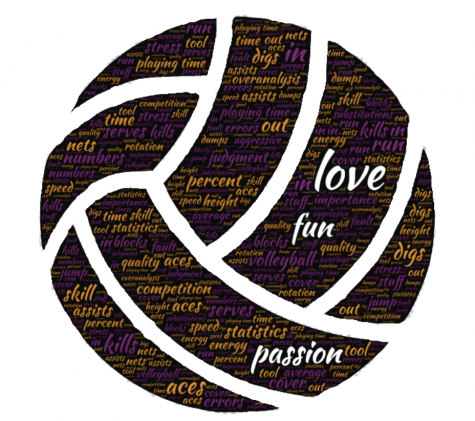The numbers game
My experience with statistics taught me not to play to the numbers
Contrary to what most high level coaches press upon players, I’d rather play volleyball because I love it, rather than doing anything and everything to win. Of course, I’m as competitive as the next guy in the gym and I want to win just as much as any of my teammates. However, I don’t want the results of the games I play to define myself as a player. The more I get stuck questioning the plays inside my head, the worse I play; the less I care about the results, the better I play and the more fun I have. I simply have no time to mull over the last play and what it meant, because I have to move on. I play every point for my team and myself. Until, of course, my scatterbrained head decided to give something else priority.
The older I get, the more complex sports have become. There’s technique, consistency, strategy. And numbers. So many numbers. In the growing world of professional sports, mathematicians and statisticians have helped change the way athletes play the game. Baseball uses data that tells their defense where to set up for each hitter, and tells the pitcher what pitches to throw, and where to throw them. In football, statistics are used to track the odds of each down being a run or a pass, and which receiver the quarterback is most likely to throw to next.
Naturally, the rise in data collection and analysis began to trickle its way down into the youth scene, when I met my first data collection system. After becoming a member of the MVHS boys volleyball team, the program decided to use an online statistics tracker, which records every play made by players and provides near-instant feedback on performance as compared to previous matches. Initially, I was really excited about it; numbers are something I easily can wrap my head around, and I thought would help better prepare me for future games. After each game, I’d check my data for how well I did.
Yet throughout my freshman season, the numbers started to play with my head. Early on, as a freshman in the program, I’d hear the same thing from the sophomores on my team. “Coach uses numbers. He’ll collect your stats and use it to identify his starters.” It seemed like a reasonable choice. Why not have the best performing players start the game? And the more I heard the same statement, the more the inevitable truth creeped up on me. Better numbers make you a better player. Therefore, you’re more likely to start.
That mentality swallowed my passion as I struggled to grasp a starting spot on the team. Every play I made, in practice or a game, my brain decided to immediately attach a number to it. And after every game, I wouldn’t check just my own numbers; I’d check everybody else’s to compare them to my own. Every week, I wouldn’t make enough serves, pass enough perfect balls or get enough assists. Next to everyone else’s data, I wasn’t playing well enough. And with the mentality that I had, I would never be able to.
My love for the sport was diminishing. I became so consumed by the data on a screen that it made me play worse, and I then chastised myself for it afterwards. I could no longer say I enjoyed every moment of what the sport had to offer; the numbers just kept following me around as I tried to improve. I would never be doing enough. I’d walk into practice and think about how I could pass better balls than somebody else, if I could serve harder than somebody else, if I could outplay everyone that played my position. I began to play a numbers game every practice and every game and it made me fall apart.

Midway through the season, we were about to play a game that really had no bearing on the team’s final results, and so coach played a different lineup. I got moved from a defensive player to an offensive player. It wasn’t what I planned, and it certainly meant that no one needed to judge me based on my performance. It wasn’t my true position. I got on the court, same as ever, this time ready to earn points instead of protecting against them. And it didn’t matter to me how the game went or how I did. I didn’t care how well I played. I began to play for the love of the game.
It ended up being my best game that season.
It took me a while to realize why I was struggling that year. I had spent so much time focusing on stats that it took away from my passion for the game. I realized that I should be playing for myself and my teammates, not for a number system that was only supposed to calculate my skill level. There are so many things that a numbers system can’t read during a game. Yes, the numbers tell you how poor a pass was, but they don’t tell you how much energy you busted to get there and save the play from ending. They don’t look at the cohesiveness of the team or the effect of support on every player. Most importantly, they cannot tell how much passion and love for a game one can spend a lifetime enthralled to.
I’ve learned to take game stats at face value. They can provide general insight into how well someone is playing, but I refuse to believe that they are the key to improvement. The numbers themselves don’t make a player better; it’s the adjustments players make afterward. And the more I dove into every single statistic, the farther I swam away from my goals. It took me a while to find my way back up, to find volleyball. Just volleyball.
I found intensity again. I found the game again. I found a way to not play for a number on a scoresheet, yet still play well. I found my way back how I always played sports.
I found love again.
Photos by Brandon Ng.

